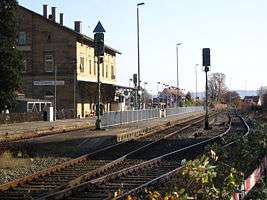Tübingen–Horb railway
| Tübingen–Horb | ||||||||||||||||||||||||||||||||||||||||||||||||||||||||||||||||||||||||||||||||||||||||||||||||||||||||||
|---|---|---|---|---|---|---|---|---|---|---|---|---|---|---|---|---|---|---|---|---|---|---|---|---|---|---|---|---|---|---|---|---|---|---|---|---|---|---|---|---|---|---|---|---|---|---|---|---|---|---|---|---|---|---|---|---|---|---|---|---|---|---|---|---|---|---|---|---|---|---|---|---|---|---|---|---|---|---|---|---|---|---|---|---|---|---|---|---|---|---|---|---|---|---|---|---|---|---|---|---|---|---|---|---|---|---|
| Route number: | 774 | |||||||||||||||||||||||||||||||||||||||||||||||||||||||||||||||||||||||||||||||||||||||||||||||||||||||||
| Line length: | 31.5 | |||||||||||||||||||||||||||||||||||||||||||||||||||||||||||||||||||||||||||||||||||||||||||||||||||||||||
| Track gauge: | 1435 | |||||||||||||||||||||||||||||||||||||||||||||||||||||||||||||||||||||||||||||||||||||||||||||||||||||||||
Legend
| ||||||||||||||||||||||||||||||||||||||||||||||||||||||||||||||||||||||||||||||||||||||||||||||||||||||||||
The Tübingen–Horb railway is a railway line in the German state of Baden-Württemberg, continuing the Neckar-Alb Railway from Tübingen to Horb. Historically the line from Plochingen to Rottweil, including the Neckar-Alb line and part of the line now called the Gäu Railway was known as the Upper Neckar Railway (German: Obere Neckarbahn).
History
The original Upper Neckar Railway opened from Plochingen to Reutlingen in 1859. It was extended via Tübingen to Rottenburg in 1861. The next section from Rottenburg to Eyach was opened in 1864 and the last section from Eyach to Horb was opened in 1866. Historically, the Upper Neckar railway included the section of line between Plochingen and Tübingen, now called the Neckar-Alb Railway.
Passenger operations

Regionalbahn services are operated on the line by DB ZugBus Regionalverkehr Alb-Bodensee (RAB), a subsidiary of DB Regio, together with the Nagold Valley Railway as part of the Kulturbahn (“culture railway”). Between Tübingen and Rottenburg services run at half hour intervals. Services run approximately hourly on the line to Horb, in order to connect with InterCity services to and from Zurich and Regional-Express trains to and from Singen. The line is operated with diesel multiple units of class 611 and class 650.3.
Freight operations
In the morning of one to two work days per week, trains of the Hohenzollern Landesbahn (HzL) run on the line from Tübingen freight yard, carrying scrap and timber to Mengen.[1] In Eyach the train runs on to HzL’s own line, the Eyach–Hechingen railway. These trains are hauled by MaK V 100 PA locomotives.
Between Eyach and Horb there is no regular freight traffic any more. All sidings of the line are closed down and/or blocked off. For example, the Rottenburg freight yard was redeveloped years for a new bus station.
Planning
For several years it has been planned to establish new or reactivated stations on the Tübingen–Rottenburg section, including at Buhl, Kilchberg and Weilheim. However, this would require sections of double track.[2] The electrification of the line has been discussed on several occasions as a diversion route for the Gäu Railway between Horb and Stuttgart.
For several years discussion have been under way on plans to integrate the line with the Neckar-Alb Railway line, together with other regional lines (Ammer Valley Railway, Erms Valley Railway, Swabian Alb Railway and the Zollernalb Railway), into the Neckar-Alb Regional Stadtbahn on the Karlsruhe model. This would require electrification of the lines. Because of the general financial situation, however, implementation is not currently in sight.
It is planned in the long run to integrate train control technology on the line, along with the Nagold Valley Railway and the Zollernalb Railway, with the regional electronic interlocking in Freudenstadt.
Notes
References
- Eisenbahnatlas Deutschland (German railway atlas) 2007/2008 edition. Schweers + Wall. 2007. ISBN 978-3-89494-136-9.